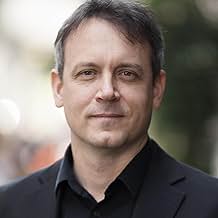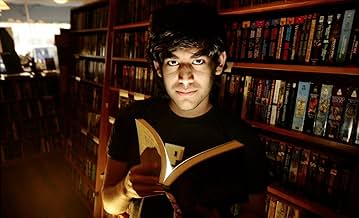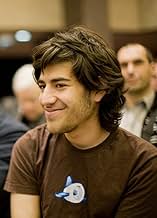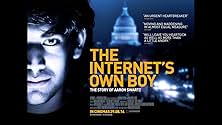The Internet's Own Boy - Die Geschichte des Aaron Swartz
Originaltitel: The Internet's Own Boy: The Story of Aaron Swartz
IMDb-BEWERTUNG
8,0/10
18.388
IHRE BEWERTUNG
Die Geschichte des Programmierwunderkindes und Informationsaktivisten Aaron Swartz, der sich im Alter von 26 Jahren das Leben nahm.Die Geschichte des Programmierwunderkindes und Informationsaktivisten Aaron Swartz, der sich im Alter von 26 Jahren das Leben nahm.Die Geschichte des Programmierwunderkindes und Informationsaktivisten Aaron Swartz, der sich im Alter von 26 Jahren das Leben nahm.
- Regie
- Drehbuch
- Hauptbesetzung
- Auszeichnungen
- 4 Gewinne & 4 Nominierungen insgesamt
Aaron Swartz
- Self
- (Archivfilmmaterial)
Stephen Heymann
- Self - Asst. U.S. Attorney Massachusetts
- (Archivfilmmaterial)
Empfohlene Bewertungen
The story of Aaron Swartz, who killed himself at the age of 26, is sad but inevitable consequence of the world we inhabit.
From his earliest days, he was a prodigy, not only developing the skills of reading and processing information at an early age, but acquiring a unique ability to write programs and offer innovative solutions to many problems presented in the early years of the Internet. With the help of testimonies from Swartz's family, plus colleagues and friends including the inventor of the web, Tim Berners-Lee, Brian Knappenberger's film traces the meteoric career of a genius who appeared to be able to offer solutions that no one else could. More significantly, Swartz had the ability to communicate with his interlocutors, not just in small-group situations but in public arenas as well. This is what rendered him such a powerful figure; although physically diminutive, he had a gift for speech-making that proved hypnotic in its effect.
Matters came to a head, however, when Swartz hacked the JSTOR sits, an address used mostly for publishing scholarly journals across all disciplines, downloaded the information and made it available to all web users. This completely contravened JSTOR's principle, which was to make that information only available to subscribers, mostly in academic institutions. The principle might have been a noble one (why shouldn't all users have equal access to information, especially if it aids their research?), but the American government's response was predictably harsh, as they charged Swartz with a variety of crimes under an Act issued as long ago as the mid- Eighties.
Knappenberger's film suggests with some justification that this reaction was ludicrously out of proportion to the nature of Swartz's so-called 'crimes.' He had neither challenged the Constitution nor caused harm to others; on the contrary he had simply worked in the interests of democratization. He was the victim of the same kind of paranoia that underpinned the anti-communist campaigns six decades ago, when legions of innocent people were rounded up and made to 'confess' their alleged involvement with a plot to subvert the American way of life, even if they had not done anything. The same applied to Swartz, who was offered the promise of lenient legal treatment in exchange for a 'confession.'
The familiarity of Swartz's plight suggests that a climate of intolerance still exists in a country that consistently advertises its democratic credentials, especially when compared with other territories in the world. THE INTERNET'S OWN BOY suggests otherwise; if the government was truly democratic, it would either have understood Swartz's motives, or meted out the same harsh treatment to other criminals - such as those who precipitated the Wall Street crisis of 2008. But who said anything was truly equal in American society?
THE INTERNET'S OWN BOT is a polemical piece that leaves viewers feeling both angry and frustrated - angry that a talented soul like Swartz should have had his life cut brutally short, and frustrated that the government should have pursued such heavy-handed treatment. If the film can inspire more activism to try and change official policies, it will have achieved much.
From his earliest days, he was a prodigy, not only developing the skills of reading and processing information at an early age, but acquiring a unique ability to write programs and offer innovative solutions to many problems presented in the early years of the Internet. With the help of testimonies from Swartz's family, plus colleagues and friends including the inventor of the web, Tim Berners-Lee, Brian Knappenberger's film traces the meteoric career of a genius who appeared to be able to offer solutions that no one else could. More significantly, Swartz had the ability to communicate with his interlocutors, not just in small-group situations but in public arenas as well. This is what rendered him such a powerful figure; although physically diminutive, he had a gift for speech-making that proved hypnotic in its effect.
Matters came to a head, however, when Swartz hacked the JSTOR sits, an address used mostly for publishing scholarly journals across all disciplines, downloaded the information and made it available to all web users. This completely contravened JSTOR's principle, which was to make that information only available to subscribers, mostly in academic institutions. The principle might have been a noble one (why shouldn't all users have equal access to information, especially if it aids their research?), but the American government's response was predictably harsh, as they charged Swartz with a variety of crimes under an Act issued as long ago as the mid- Eighties.
Knappenberger's film suggests with some justification that this reaction was ludicrously out of proportion to the nature of Swartz's so-called 'crimes.' He had neither challenged the Constitution nor caused harm to others; on the contrary he had simply worked in the interests of democratization. He was the victim of the same kind of paranoia that underpinned the anti-communist campaigns six decades ago, when legions of innocent people were rounded up and made to 'confess' their alleged involvement with a plot to subvert the American way of life, even if they had not done anything. The same applied to Swartz, who was offered the promise of lenient legal treatment in exchange for a 'confession.'
The familiarity of Swartz's plight suggests that a climate of intolerance still exists in a country that consistently advertises its democratic credentials, especially when compared with other territories in the world. THE INTERNET'S OWN BOY suggests otherwise; if the government was truly democratic, it would either have understood Swartz's motives, or meted out the same harsh treatment to other criminals - such as those who precipitated the Wall Street crisis of 2008. But who said anything was truly equal in American society?
THE INTERNET'S OWN BOT is a polemical piece that leaves viewers feeling both angry and frustrated - angry that a talented soul like Swartz should have had his life cut brutally short, and frustrated that the government should have pursued such heavy-handed treatment. If the film can inspire more activism to try and change official policies, it will have achieved much.
I don't know why the Aaron Swartz story was never on my radar, which is one of the reasons why The Internet's Own Boy was an eye-opener. His is a tragic story, and although the filmmakers secured screen time with (almost) all involved, it's sad that all we have from Swartz is archival webcam interview footage. The movie makes a persuasive case for his being made a high-profile example by the justice system, and there's enough here to leave you either irate or fearful (or both).
Whether or not you agree with the man's politics, he made a difference - hell, he was instrumental in getting SOPA struck down, so he deserves our respect for that - and his story brings to light the need for fine-tuning the ancient copyright laws. Either way, this documentary delivers.
7/10
Whether or not you agree with the man's politics, he made a difference - hell, he was instrumental in getting SOPA struck down, so he deserves our respect for that - and his story brings to light the need for fine-tuning the ancient copyright laws. Either way, this documentary delivers.
7/10
The Internet's Own Boy was very well-received at its showing in Austin's SXSW Film Festival. The film is simultaneously a biography of the tragic death of internet pioneer Aaron Swartz and at the same time a fascinating history of the development of the online political movements that he devoted his life to. The film tells a fascinating story of young genius deeply involved in the early development of the internet including co-founding of Reddit. His genius is unquestionable. The film really provides a tribute to a talented young man and presents a strong case that he was unjustly and selectively prosecuted and overcharged by an overzealous prosecutor. This prosecution seems to have provoked his suicide.
But the film is unable to establish any real emotional distance from its subject in order to present an objective full picture of Aaron. Early scenes show home movie pictures of Aaron as an adorable precocious toddler playing with his brothers. From this beginning it is impossible to establish the emotional independence necessary to shine any sort of critical light on Aaron's life or activities. The interviews are all with his family, friends and supporters and don't really critique his efforts. He becomes a victim who despite his incredible genius seems to lose responsibility for his own actions including his own suicide. He becomes purely a victim of government persecution with no real responsibility for his own life decisions including his various hacking activities that ultimately lead to his arrest.
The film really presents Aaron Swartz as a modern-day martyr for the cause of an open access to the internet that he deeply believed in and dedicated himself to. Perhaps because of his recent and tragic death the filmmaker seems unwilling to question the ethics of Aaron's hacker-like tactics. There really aren't any voices raising serious questions about whether his efforts to take the law into his own hands by downloading millions of documents was truly an appropriate form of civil disobedience. He did, in fact, steal millions of articles and violate intellectual property rights through his actions. He undoubtedly believed that what he was doing was right and just.
The film is thus more of a tribute to his life and a critique of the criminal justice system than it is a balanced examination of his controversial history which deserves closer examination. The filmmaker seems to be too close to Aaron's legacy to present a truly objective self-critical examination of his legacy and his somewhat radical view of open access to knowledge and information. While it is easy to argue for that view, it overlooks the complexity of case for protecting intellectual property rights.
Ironically, Aaron seems more far impressive and righteous when he is fighting successfully to defeat the SOPA bill than when he is stealing copyrighted materials. This showed his remarkable ability to organize online and unify people in a collective action that made a real difference for the future of the internet. The tragedy is that this great young activist self-destructed. The filmmaker turns his heroism into victimization and I think may actually undermine his own effort to pay tribute to Aaron. The best tributes are those that are present a complete picture rather than build-up a myth. Never-the-less, despite its flaws this is a powerful and important film that is highly recommended to begin to understand who Aaron Swartz was and to learn about the important issues of intellectual freedom online that he devoted himself to.
But the film is unable to establish any real emotional distance from its subject in order to present an objective full picture of Aaron. Early scenes show home movie pictures of Aaron as an adorable precocious toddler playing with his brothers. From this beginning it is impossible to establish the emotional independence necessary to shine any sort of critical light on Aaron's life or activities. The interviews are all with his family, friends and supporters and don't really critique his efforts. He becomes a victim who despite his incredible genius seems to lose responsibility for his own actions including his own suicide. He becomes purely a victim of government persecution with no real responsibility for his own life decisions including his various hacking activities that ultimately lead to his arrest.
The film really presents Aaron Swartz as a modern-day martyr for the cause of an open access to the internet that he deeply believed in and dedicated himself to. Perhaps because of his recent and tragic death the filmmaker seems unwilling to question the ethics of Aaron's hacker-like tactics. There really aren't any voices raising serious questions about whether his efforts to take the law into his own hands by downloading millions of documents was truly an appropriate form of civil disobedience. He did, in fact, steal millions of articles and violate intellectual property rights through his actions. He undoubtedly believed that what he was doing was right and just.
The film is thus more of a tribute to his life and a critique of the criminal justice system than it is a balanced examination of his controversial history which deserves closer examination. The filmmaker seems to be too close to Aaron's legacy to present a truly objective self-critical examination of his legacy and his somewhat radical view of open access to knowledge and information. While it is easy to argue for that view, it overlooks the complexity of case for protecting intellectual property rights.
Ironically, Aaron seems more far impressive and righteous when he is fighting successfully to defeat the SOPA bill than when he is stealing copyrighted materials. This showed his remarkable ability to organize online and unify people in a collective action that made a real difference for the future of the internet. The tragedy is that this great young activist self-destructed. The filmmaker turns his heroism into victimization and I think may actually undermine his own effort to pay tribute to Aaron. The best tributes are those that are present a complete picture rather than build-up a myth. Never-the-less, despite its flaws this is a powerful and important film that is highly recommended to begin to understand who Aaron Swartz was and to learn about the important issues of intellectual freedom online that he devoted himself to.
This is a very good documentary of a subject that EVERYONE should be interested in. If you're interested in the Internet, technology, open publishing (science or law), or freedom, you MUST watch this documentary. It's a moving and disturbing story of a very important young man, and how the government tried to make an example out of him.
Where it fails, is dealing with Aaron's mental health issues. His struggles with depression (which he documented in his blog) were glossed over, and even dismissed (such as when he brother said he didn't remember any mood swings as a child). I think this was purposefully done to fit the thesis of the documentary (that the prosecution backed him into a corner), and ignores a major part of Aaron's life. Just because he was "at-risk" due to mental illness, doesn't mean he wasn't targeted and persecuted. Instead, his depression was swept under the rug by the filmmaker, as it so often is in our society.
Overall, this is a very important film and I would highly recommend it. However, read Aaron's blogs and writings for supplemental info!
Where it fails, is dealing with Aaron's mental health issues. His struggles with depression (which he documented in his blog) were glossed over, and even dismissed (such as when he brother said he didn't remember any mood swings as a child). I think this was purposefully done to fit the thesis of the documentary (that the prosecution backed him into a corner), and ignores a major part of Aaron's life. Just because he was "at-risk" due to mental illness, doesn't mean he wasn't targeted and persecuted. Instead, his depression was swept under the rug by the filmmaker, as it so often is in our society.
Overall, this is a very important film and I would highly recommend it. However, read Aaron's blogs and writings for supplemental info!
9xWRL
This warm yet chilling documentary retraces the life of Aaron Swartz, who committed suicide at age 26 after a couple of years of severe and deepening pressure from the criminal justice system, which was trying him for a number of felonies resulting from his breaking into MIT's computers.
We first see him as a young kid in home movies, then as a prodigy who while very young was brimming with new ideas for the Internet and applied genius-level programming skills to co-developing RSS and Reddit. Bored with college and with working for the business establishment, he turned to activism, promoting an open Web culture for the benefit of all users.
Swartz's activism turned into hacktivism, landing him in deep trouble with the Justice Department, which charged him with crimes that could have sent him to prison for 35 years. Touching, pointed accounts from family members and close associates describe what Aaron was like and how he responded to unyielding Justice Department efforts to use him as an example.
The interviews with law professor Lawrence Lessig and World Wide Web inventor Tim Berners-Lee are unforgettably moving. The film does a good job of calling into question Swartz's harsh treatment by the same Justice Department that shied away from prosecuting the big money interests that brought down our financial system.
Whether you sympathize with Swartz or not, the film does a solid job of showing how blind justice in the U.S. can be when it wants to be.
We first see him as a young kid in home movies, then as a prodigy who while very young was brimming with new ideas for the Internet and applied genius-level programming skills to co-developing RSS and Reddit. Bored with college and with working for the business establishment, he turned to activism, promoting an open Web culture for the benefit of all users.
Swartz's activism turned into hacktivism, landing him in deep trouble with the Justice Department, which charged him with crimes that could have sent him to prison for 35 years. Touching, pointed accounts from family members and close associates describe what Aaron was like and how he responded to unyielding Justice Department efforts to use him as an example.
The interviews with law professor Lawrence Lessig and World Wide Web inventor Tim Berners-Lee are unforgettably moving. The film does a good job of calling into question Swartz's harsh treatment by the same Justice Department that shied away from prosecuting the big money interests that brought down our financial system.
Whether you sympathize with Swartz or not, the film does a solid job of showing how blind justice in the U.S. can be when it wants to be.
Wusstest du schon
- Zitate
First Title Cards: Unjust Laws exist; shall we be content to obey them, or shall we edeavor to amend them, and obey them until we have suceeded, or shall we transgress them at once?- Henry David Thoreau
- VerbindungenFeatures Das zauberhafte Land (1939)
- SoundtracksExtraordinary Machine
Written and Performed by Fiona Apple
Top-Auswahl
Melde dich zum Bewerten an und greife auf die Watchlist für personalisierte Empfehlungen zu.
- How long is The Internet's Own Boy: The Story of Aaron Swartz?Powered by Alexa
Details
- Erscheinungsdatum
- Herkunftsland
- Offizieller Standort
- Sprache
- Auch bekannt als
- Tod eines Internet-Aktivisten - Die Aaron Swartz-Story
- Produktionsfirmen
- Weitere beteiligte Unternehmen bei IMDbPro anzeigen
Box Office
- Bruttoertrag in den USA und Kanada
- 48.911 $
- Eröffnungswochenende in den USA und in Kanada
- 21.705 $
- 29. Juni 2014
- Weltweiter Bruttoertrag
- 48.911 $
- Laufzeit1 Stunde 45 Minuten
- Farbe
- Seitenverhältnis
- 1.78 : 1
Zu dieser Seite beitragen
Bearbeitung vorschlagen oder fehlenden Inhalt hinzufügen

Oberste Lücke
What is the Spanish language plot outline for The Internet's Own Boy - Die Geschichte des Aaron Swartz (2014)?
Antwort

























